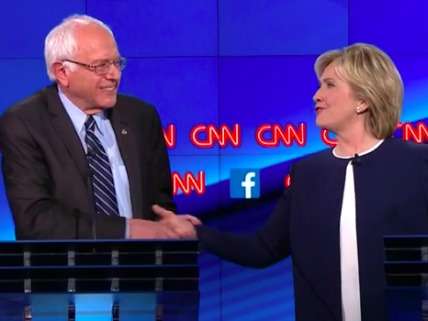Sanders and Clinton Both Want to Overturn Citizens United, but Neither Knows How
Sanders thinks a single appointee can get it done in short order, while Clinton relies on unconstitutional reasoning.

Six years ago in Citizens United v. Federal Election Commission, the Supreme Court overturned legal restrictions on political speech by unions and corporations (including nonprofit advocacy groups). Bernie Sanders and Hillary Clinton are both committed to reversing Citizen United, but neither of them seems to understand how that would work.
Last week, as Scott Shackford noted on Saturday, Sanders declared on Twitter that "any Supreme Court candidate of mine will make overturning Citizens United one of their first decisions." It seems that the Vermont senator (or whoever was speaking on his behalf) thinks a single justice has the power to reverse any precedent he dislikes, even without waiting for an appropriate case to come along.
Hillary Clinton has a firmer grasp of the legal mechanics involved in overturning a Supreme Court decision, saying, "I'll appoint Supreme Court justices who recognize that Citizens United is bad for America" and "if necessary, I'll fight for a constitutional amendment that overturns it." The former secretary of state thus implicitly concedes that Citizens United might survive even if she gets to appoint a justice or two. The oldest justice, Ruth Bader Ginsburg, was on the losing side in that decision, and there is no guarantee that Antonin Scalia or Anthony Kennedy, who are both a few years younger than Ginsburg, would retire while Clinton had the power to pick their successors. Although a constitutional amendment is an even longer shot, it is at least technically possible, unlike the Sanders plan.
Sanders nevertheless has a better understanding of the legal reasoning that would be required to renounce Citizens United. In his brief for "Getting Big Money Out of Politics and Restoring Democracy," he faults the Supreme Court for endorsing the "absurd notion" that "giving huge piles of undisclosed cash to politicians in exchange for access and influence does not constitute corruption." He argues that the super PACs made possible by Citizens United in effect "are enabling the wealthiest people and the largest corporations in this country to contribute unlimited amounts of money to campaigns." That language reflects the main rationale the Supreme Court has used to uphold limits on election-related spending: the prevention of actual or perceived corruption.
Clinton, by contrast, complains that the spending allowed by Citizens United is "drowning out the voices of ordinary Americans and distorting our democracy." That suggests campaign finance regulations serve the constitutionally dubious goal of maintaining "balance" in political debates, making sure that everyone gets a fair hearing and no one talks too much. That rationale, unlike the goal of preventing corruption, has never been fully embraced by the Supreme Court (although a 1990 decision, overturned in Citizens United, nodded in that direction). In a 1996 law review article, future Justice Elena Kagan, who as solicitor general represented the government in Citizens United, deemed it well established that "the government may not restrict the speech of some to enhance the speech of others."
As I showed in my 2010 Reason cover story about the reaction to Citizens United, Clinton is not the only critic of the decision who seems to disagree with that principle. President Obama uses similar language, saying "powerful interests must not be allowed to drown out the voices of ordinary citizens." Obama and Clinton in effect want to appoint federal bureacrats as national debate moderators, a role that is pretty hard to reconcile with the command that "Congress shall make no law…abridging the freedom of speech."


Show Comments (46)